︎︎︎ STORIES BETWEEN AL' AKHAWAT
march to may 2025
For this residency, curator Bruno Leitão* invited the Al' Akhawat Collective*, made up of artists from the Moroccan-Spanish diaspora, to develop a project that explores the construction of hybrid identities and the sense of belonging inherent in the migrant experience.
Through participatory encounters and exploration of everyday spaces, the aim was to generate pieces that highlight the tensions of living ‘here’ and ‘there’ simultaneously, inviting deep reflection on memory, absence and community building. Curator Bruno Leitão proposed a line of work that led to the creation of a reading club.
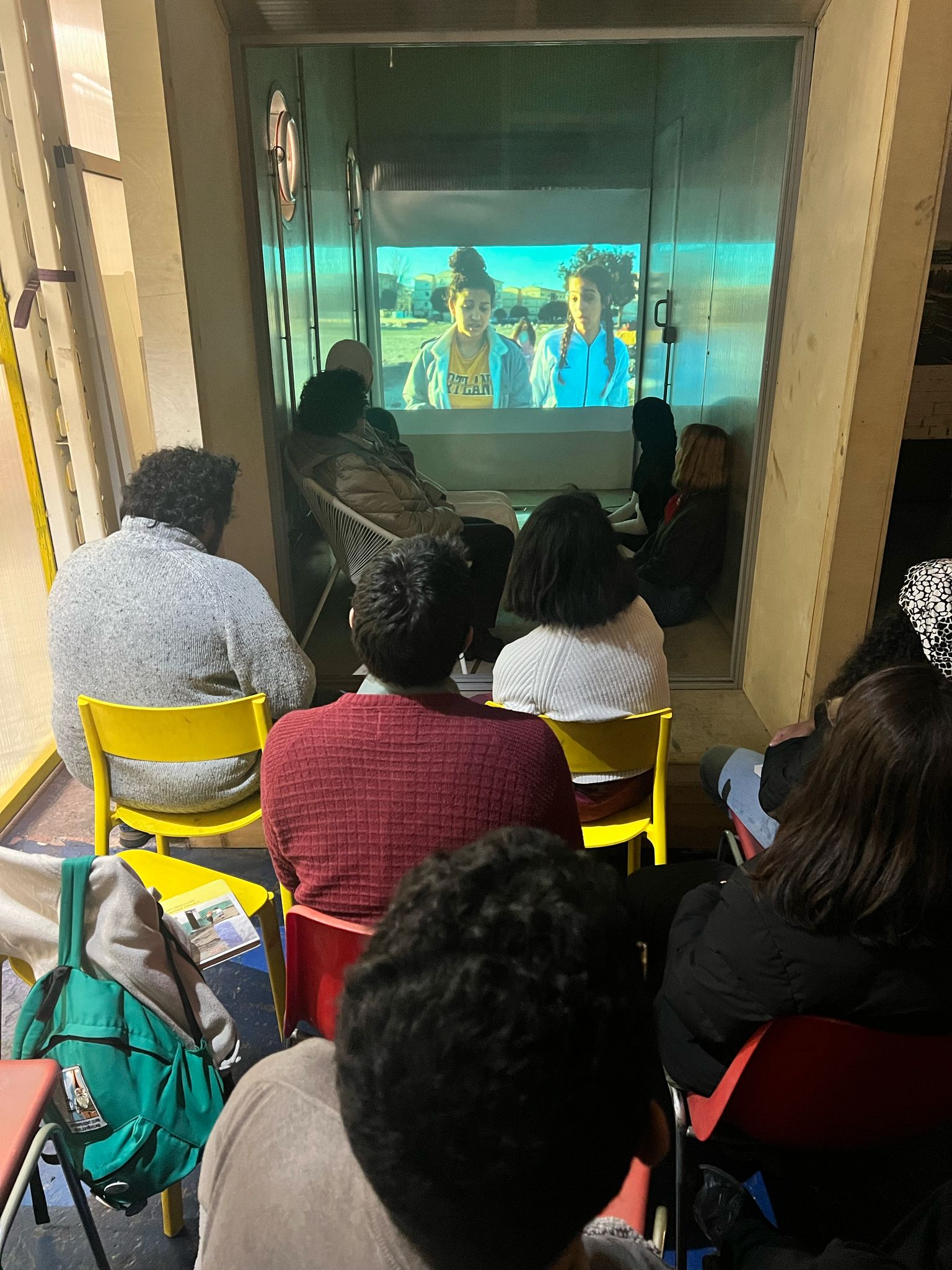

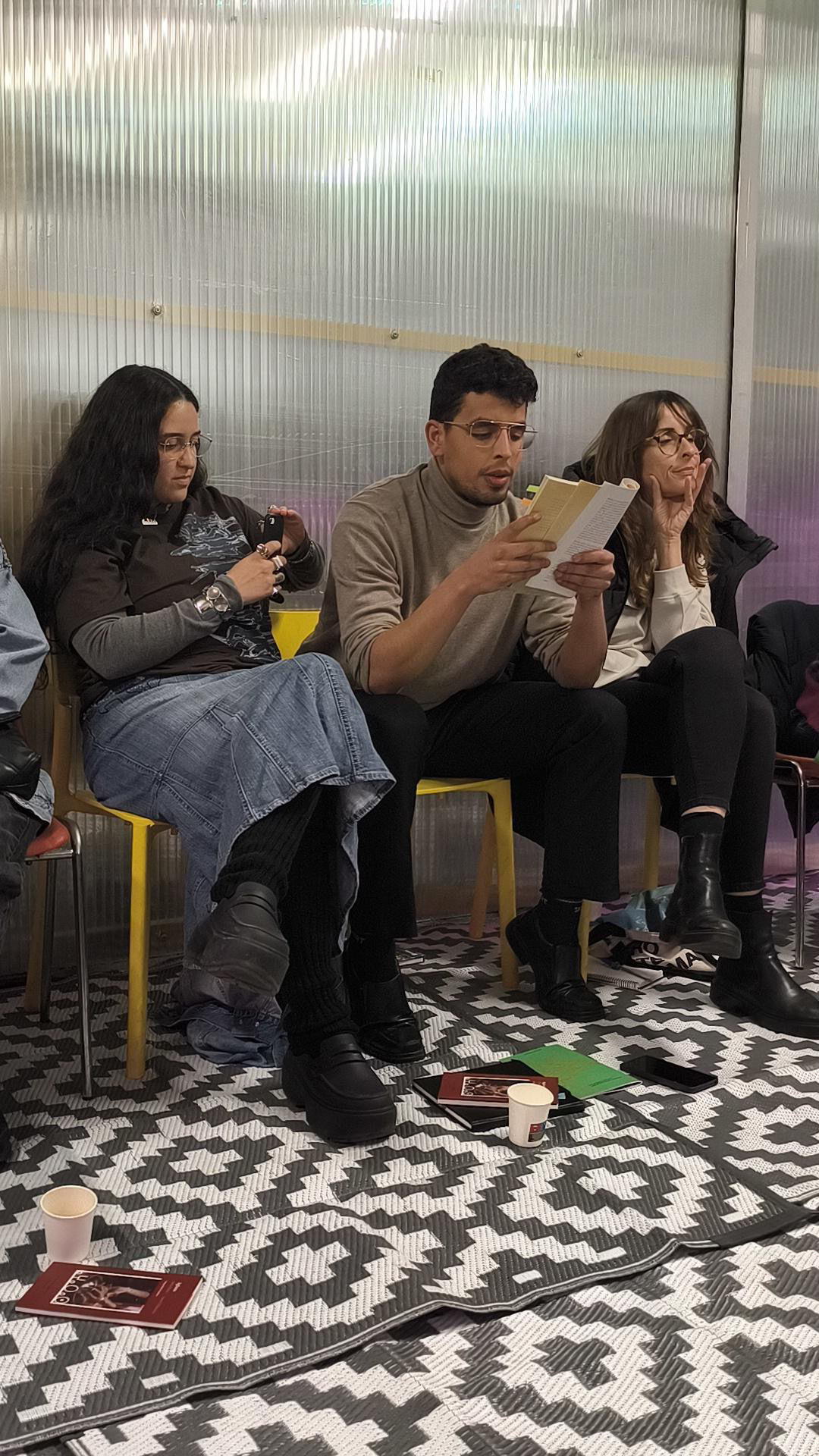
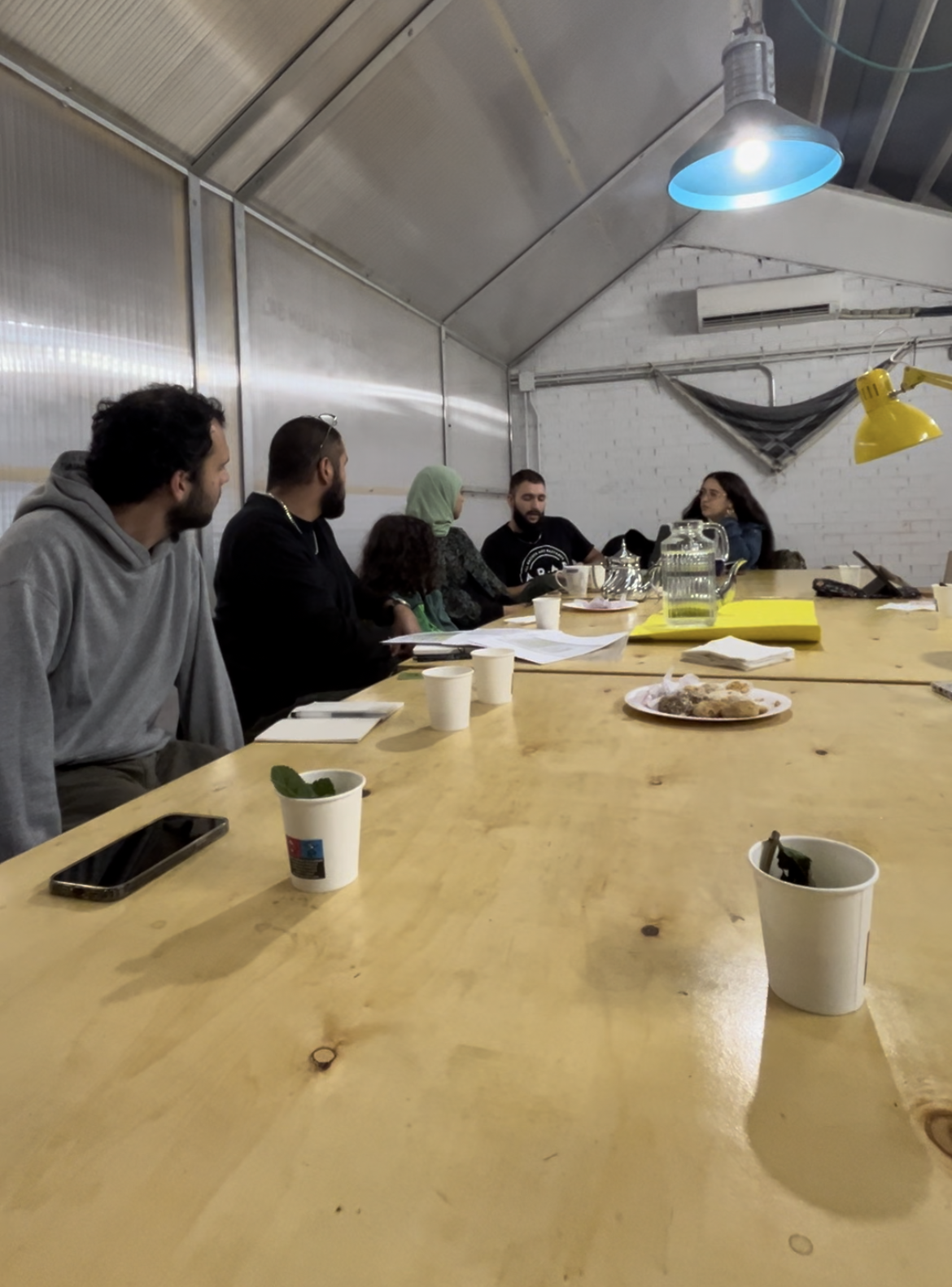

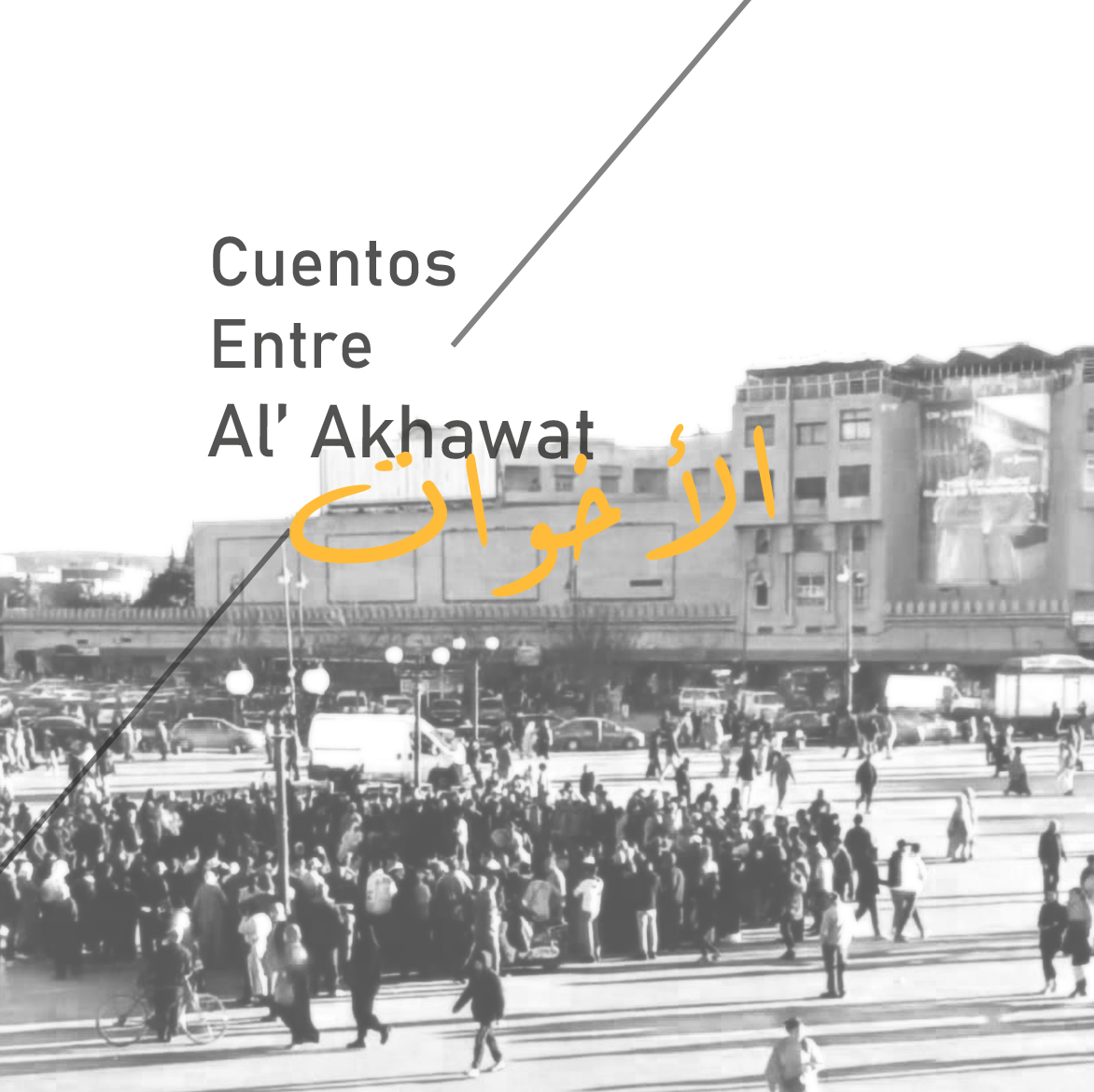
From March to May, this reading group took place in two phases, preceded by an introductory session in which we presented the collective's work and history. Throughout this process, two books were studied: El pan a secas (Bread Alone) by Mohammed Chukri, and Patanes y bárbaros (Boors and Barbarians) by Houria Bouteldja.
Some of the sessions were complemented by screenings of short films and video material, which accompanied the reflections that arose from the reading. All sessions were accompanied by tea and food, creating an atmosphere of dialogue and conviviality.
Final publication:
Text from the Al’Akhawat collective about process.
Our residence originated from the creation of a reading club called ‘Cuentos entre Al Akhawat’ (Stories among Al Akhawat). In this club, we used the works of two North African writers as a common thread: Mohammed Chukri's For Bread Alone and Houria Bouteldja's Barbarians. In reality, we only used these works as a pretext to bring to the table the multiple realities and concepts that most of us were experiencing.
The club was divided into five sessions, accompanied by tea, sweets and even the screening of short films related to the topic at hand, such as Loose Fish and Farrucas. The first session sought to create an initial space, a shoulder on which we could all lean, allowing us the freedom to express ourselves and share all our concerns and feelings. We realised how necessary it was to have a place where
we could talk without feeling judged. For the first time, we were not ashamed of our vulnerable side, as the room unwittingly became a space for confessions.
Throughout the sessions, conversations opened up about our reality as migrant bodies living in the diaspora, about our identity, both imposed and constructed; about precariousness, about capitalism, about the labour exploitation of
immigrant bodies, about our burdens, our pressures, our concerns, so silenced, by ourselves and by others. We talked about the other, who sometimes does not even exist. We talked about class, about the term race, about religions, taboos, norms... The least we did was read the work in the space. First, we shared reflections on what we had read, and that gave rise to the discussion, which, without asking for it, emerged as an easy release.
In order to collect the reflections that arose, we created a fanzine, to which we invited the attendees to participate. The result was a beautiful work where, among images and various notes, everything we feared to share was verbalised, materialised, and became eternal. Thus questioning academia and institutions. The art of speaking, of thinking, is our most valuable weapon. And it has been achieved as a result of many struggles by others.
In order not to limit the work to a fanzine, we collected some of these reflections and transferred them to a six-metre-long piece of fabric, which was painted with red acrylic. This was a token of our gratitude not only to the venue for hosting us, but also to the participants.
May words be our most courageous weapon and may unity continue to build for
one another.
Curatorial text by Bruno Leitão.
The residency ‘Cuentos entre Al Akhawat’ arose from the idea of allowing reading—that intimate yet deeply political gesture—to become a platform for the convergence of shared memories, bodies, and urgencies.
When Todo por la Praxis asked me to invite artists or collectives to work with them at Espacio de Todo, I immediately thought of Al'Akhawat. Al Akhawat is a collective that
combines critical reading, participatory pedagogy and artisanal micro-publishing to make the memories of the diaspora visible and generate communities of care on both sides of the Strait. Together with them, we imagined the possibility of creating a reading club that would consciously break with the usual dynamics of a closed and rigidly structured workshop and instead dare to explore the transformative power of a porous, flexible space that is always open to discovery.
Our starting point was simple: the text, as a catalyst, would become the initial spark from which we could ignite multiple conversations that, through shared tea
and projected videos, could transcend any hierarchy. We did not want to reproduce structures; we wanted to let ideas and reflections flow freely, without predetermined scripts. Thus, reading became a living, shared exercise, where each participant brought personal experiences and memories that deeply enriched the discussions. We were inspired by references such as the Zapatista school, where learning is always mutual and horizontal, and by the ideas of Francesc Tosquelles, where the wounded are also
active agents of their own healing in encounters that facilitated the constant exchange of experiences and knowledge. This approach allowed us to create a community of mutual care, where every voice found its space, where every personal story was valued and listened to with respect and genuine attention.
The journey we shared was divided into two main phases, although we soon discovered that this apparent division was more symbolic than practical, as the boundaries between sessions were constantly blurred. We began with an introductory session that outlined the previous journey of the Al'Akhawat collective, exploring their experiences, struggles and lessons learned, and then immersed ourselves in the shared and attentive reading of excerpts from "El
pan a secas‘ by Mohammed Chukri and ’Patanes y bárbaros" by Houria Bouteldja. These books were not treated as isolated objects, but were constantly discussed in dialogue with audiovisual pieces such as the short films Farrucas and Loose Fish, as well as with the personal experiences
that the participants contributed week after week, enriching and adding complexity to each session.
Our methodology became rhizomatic, with the reading of these texts mediated by Al Akhawat adding several sublayers of interpretation that reading alone and from Spain could never create.
As we progressed, the collective decided to share a physical archive. This gave rise to the idea of creating a living, tangible and open archive that could collect fragments, notes, references, fleeting thoughts and meaningful silences that remained suspended in the air at the end of each meeting. This archive took the form of a collective fanzine, designed so that anyone—whether a regular participant or someone outside the group—could access this material and prolong or reinterpret the conversations in different contexts. This document was not intended to be a closure or a conclusion, but rather a starting point
for new questions, new dialogues and future communities.
This whole process materialised in a meal-presentation. In addition to the fanzine, the collective also understood the importance of challenging and constantly putting theory and practice in tension. That is why they wanted to develop another complementary piece, a work capable of extending their collective thinking to other languages, other formats, and other future possibilities, further opening up the space for conversation and reflection. With these actions, we sought to highlight resistance to the systematic erasure and oblivion of diverse histories and voices, insisting on the radical importance of telling, listening to, and celebrating our own narratives.
The residency demonstrates that shifting the curatorial focus towards a facilitating role reinforces the effectiveness of the process and multiplies the community impact. The combination
of a self-managed reading club, private mentoring and final products generated situated knowledge and materials for institutional dissemination. This model advocates for the articulation of collective research, cultural production and citizen participation.
︎︎︎ Public opening ‘CUENTOS ENTRE AL'AKHAWAT’
10 may 2025
To mark the end of the residency and the public opening, as well as a final meeting, two pieces were presented that arose from the shared experience during the reading club. One of them takes shape from the archive generated in the process, collecting materials, references, and fragments that accompanied the meetings. The other proposes a reflection that seeks to stretch the boundaries between practice and theory, giving rise to a production that continues collective thinking through other languages.
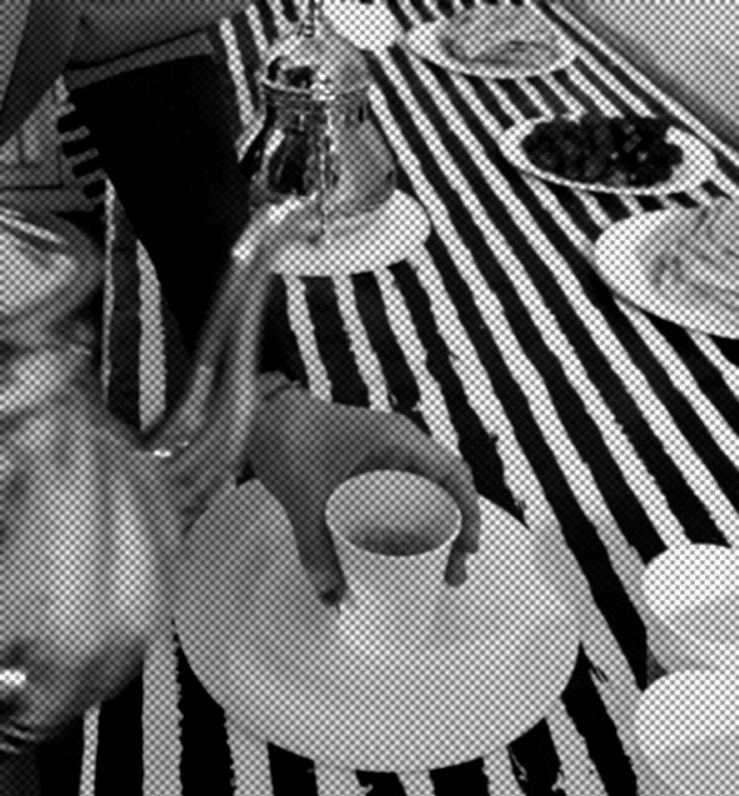

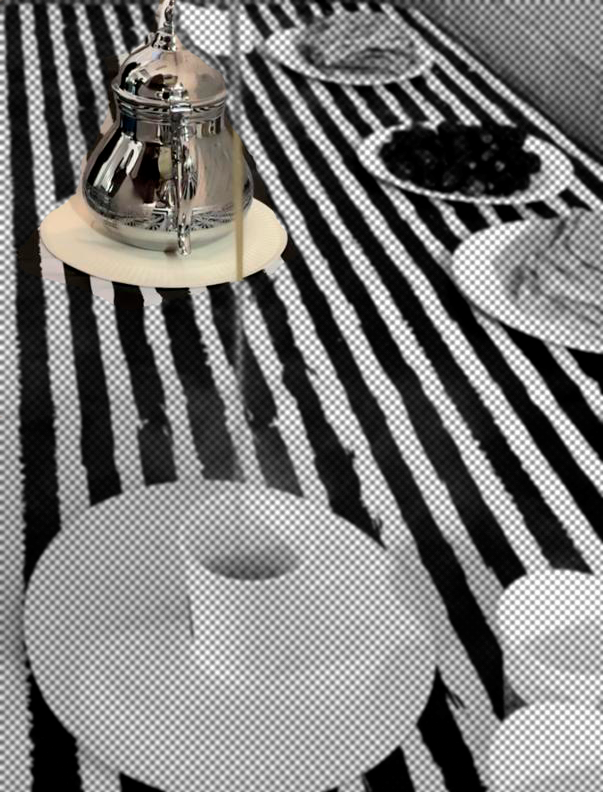
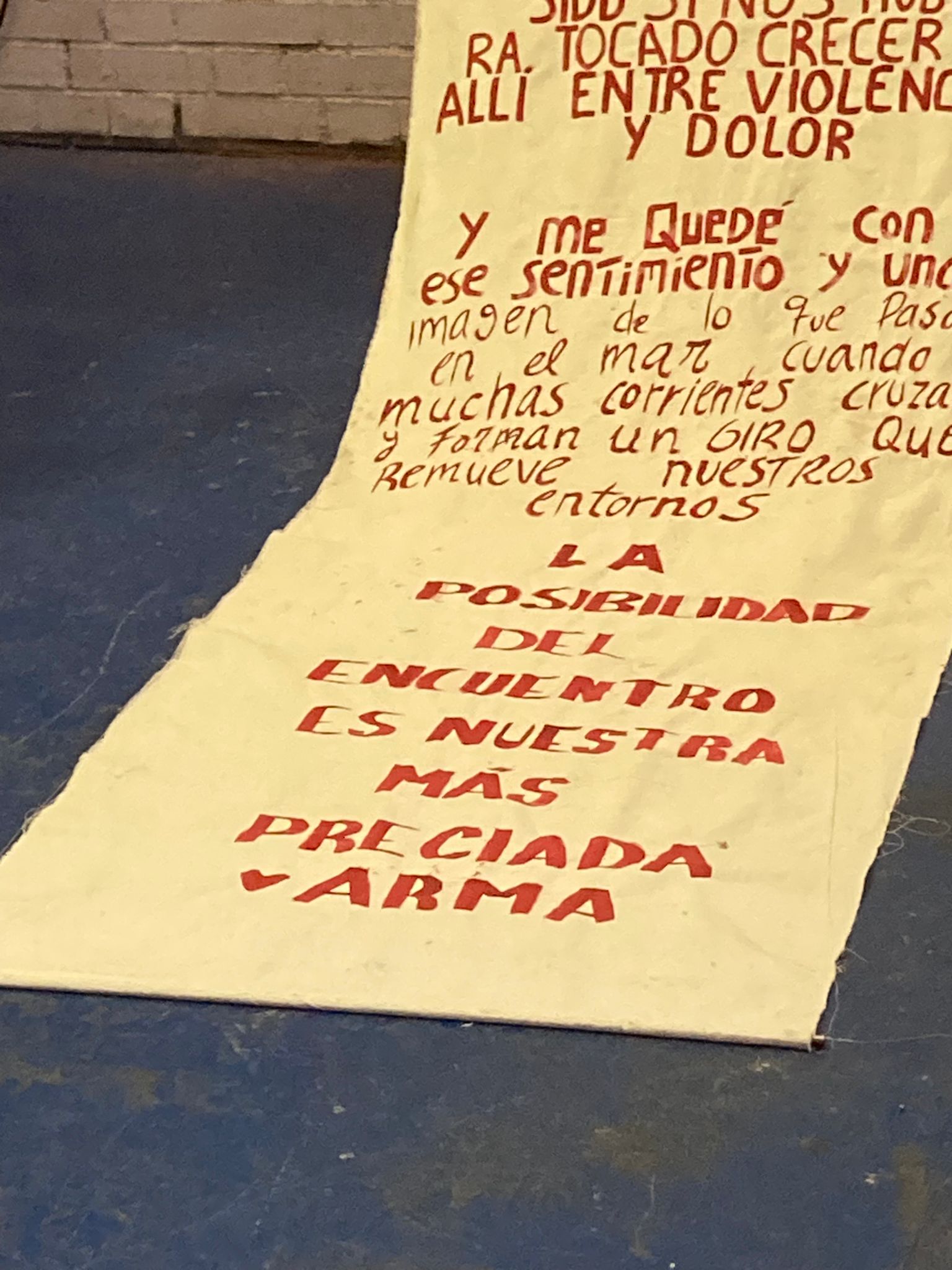

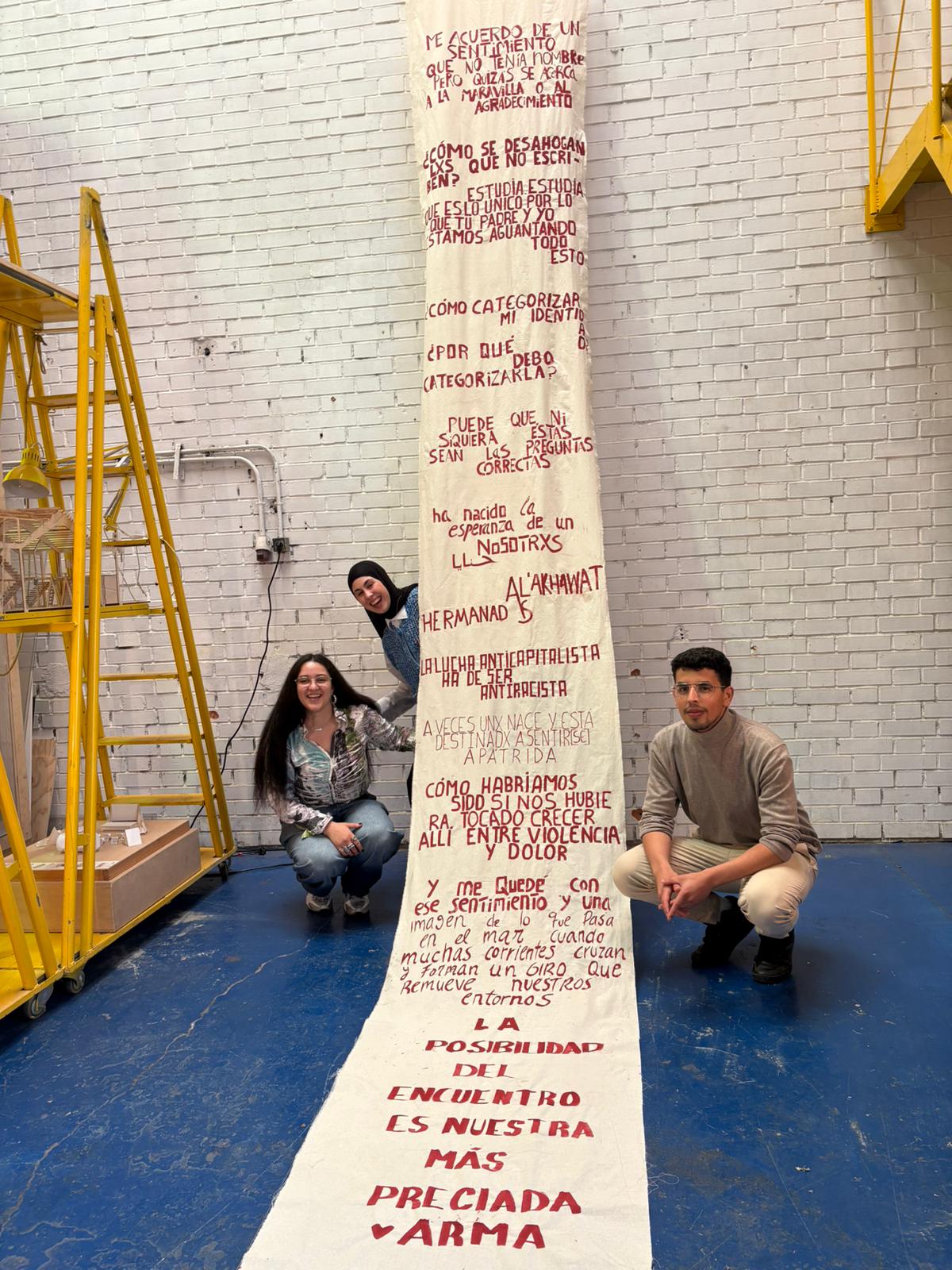
*Bruno Leitão is a curator with an academic background in Fine Arts from ESAD CR and a postgraduate degree in Curatorial Studies from the University of Lisbon and the Calouste Gulbenkian Foundation. He is currently pursuing a PhD at the UAM in Madrid.
He was the founder and curatorial director of Hangar Centro de Investigação Artística in Lisbon. During his tenure, he programmed a wide range of exhibitions, talks, and seminars with internationally renowned artists such as Luis Camnitzer, Coco Fusco, Carlos Amorales, The Otolith Group, John Akomfrah, Rosa Barba, João Onofre, Lawrence Abu Hamdan, Elena Bajo, João Maria Gusmão and Pedro Paiva, Alfredo Jaar, Fernanda Fragateiro, and Zined Sedira, as well as prominent research groups such as Península.
He has also curated exhibitions such as Pouco a Pouco at the CGAC (Santiago de Compostela, 2019), the first solo retrospective of Ângela Ferreira in Spain; Affective Utopia at the Kadist Foundation (Paris, 2019); You Love Me, You Love Me Not at the Galería Municipal do Porto (Porto, 2015); and Atelier Utopía at Porto Fundação EDP (2012), among others.
For five years, he was chief curator of the FAS International Collection, focusing on African art and its diaspora. He is a member of the curatorial committee for the 7th and 8th editions of the Lubumbashi Biennale.
In the field of consulting, he has collaborated with institutions such as the Matadero Artistic Residency Centre and Espacio Afro, among others, and has contributed both as an editor and author in the publishing field. His published works include Curating Coloniality in Contemporary Iberia, co-edited with Carlos Garrido Castellano, and he has contributed texts to publications and catalogues such as Atlantica, The Gap, and Artishock. He has been a member of juries for various awards and scholarships. He currently resides in Madrid.
*Al'Akhawat Collective. The result of the crossroads of six artists belonging to the Moroccan-Spanish diaspora: Sanae Mokaddim Ayadi, Youssef Taki Miloudi, Karim Khourrou Gadour, Oumaima Manchit Laroussi, Aicha Josefa Trinidad Gououi.
The feeling of belonging, of being (and not being) from here and there, has been a way of being in the world that has marked the vast majority of migrants who have grown up reflecting the diaspora. This collective and this encounter bring together various processes to convey realities that affect a large part of the migrant population, extrapolating the personal to the communal.
They consider themselves subjects and objects that have been in constant motion, finding a place in shared experiences and seeking a space, a community to inhabit in order to share, using different artistic disciplines such as words, photography, installation and visual arts.
Noteworthy are their works +212, exhibited at TEA (Espacio de las Artes de Tenerife), and Alló? Labas?, exhibited at Nadie Nunca Nada Nada.
